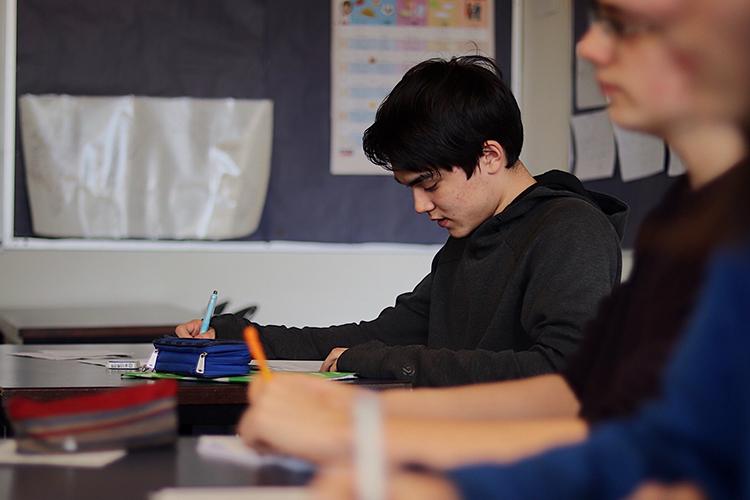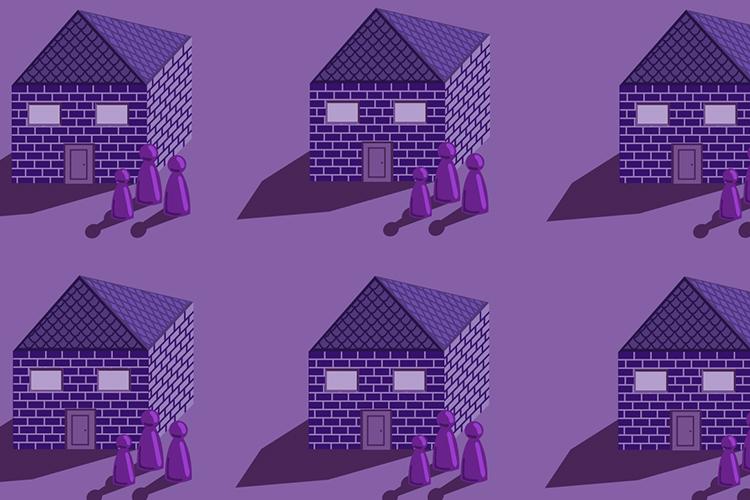
Sophomore Kai Fulbright sets down his pencil and walks with his quiz to the front of the classroom, fidgeting as he hands it in. His mind fills with self-doubt and worry that he may have messed up a problem, and he starts to bite his nails.
For Fulbright, receiving a single B on his midterm report card would be disastrous. In order to pursue his passion for track, he needs to ace this quiz. Otherwise, his dad will not allow him to compete this season. For the rest of the day, Fulbright compulsively checks the Synergy StudentVue app on his phone for updates on his grade, anxiously awaiting the result.
Due to anxiety surrounding his grades, Fulbright often bites his nails and has noticed calluses on his hands from nervous fidgeting. Growing up, Fulbright’s father always told him, “Academia first, everything else later.” Although he understands his father’s concern about his academic performance, the pressure Fulbright feels to earn straight A’s causes him intense stress.
“It’s kind of ironic because my dad, right before transitioning into high school, he told me that high school is supposed to be the best four years of my life,” Fulbright says. “And I feel like all this pressure … reduces the fun of being in high school and all the opportunities I have.”
While younger students can focus more on their learning, grades become a dominating focal point in high school. Fulbright is one of many students at high schools throughout the U.S. who feel the pressure to receive top grades.
“C’s are supposed to be like, ‘you’re good, you understand the material enough for you to pass,’” says Fulbright. “C’s are good, but now a lot of the kids I know … they treat C’s as if they’re basically failing.”
According to Statista, a company that provides statistics more students are enrolled in college than ever before. Because of this increase in college attendance, admissions are significantly more competitive. A study by the U.S. News and World Report stated that the acceptance rate for Columbia University in New York in 1998 was 65 percent. By 2014, acceptance had dropped to less than 7 percent. As a result, there is greater influence on each of the factors that colleges consider for applicants, including receiving good grades in high school.
At Grant, where, according to the (Oregonian’s school performance) review, only 16 percent of students are economically disadvantaged — eligible for free or reduced lunch — many students’ families expect them to go to college. With college admission rates decreasing as more and more students apply, it has become increasingly essential to maintain good grades.
For historically disadvantaged students, the pressure to get good grades can be more difficult.
Senior Veronica Rasheed, who is Black, feels that when the curriculum is not culturally responsive, it can be more difficult for students of color to stay engaged. “I think that most of the curriculum is made up by someone who is not a person of color … they only think about White students and how White students learn and not about everyone else,” she says. “In classrooms, like most of the times people of color don’t understand it or it’s something that doesn’t connect to us, so we won’t really pay attention, or we don’t find interest in that because it’s boring.”
Rasheed says that in order to maintain her grades, she sometimes learns the curriculum outside of school because of how disengaging some of her classes have been. She often does this during Flex, a free work time that typically occurs twice a week, or her tutorials in Advancement
Via Individual Determination (AVID), a college readiness class.
Within Portland Public Schools (PPS), issues of grade equity have come into question. A recent audit by the late Oregon Secretary of State Dennis Richardson found a 35 percent achievement gap between economically advantaged students and economically disadvantaged students, as well as a 53 percent gap between White and Black students. The disparity is blatant.
According to the team leader on the audit, Scott Learn, “(PPS is) comparing African-American kids classified as economically disadvantaged in PPS with those kids in other districts like David Douglas and Salem-Keizer and Beaverton. The kids weren’t doing as well.”
These inequities are exacerbated by the fact that the mean grade point average among high school students has been rising, while the average SAT score has decreased. According to a study by Michael Hurwitz of the College Board and Jason Lee of the University of Georgia’s Institute of Higher Education, the average high school GPA rose from a 3.27 in 1998 to a 3.38 in 2016.
A study by Michael J. Petrilli and Amber M. Northern of the Thomas B. Fordham Institution displays that this national grade inflation does not impact all students equally. The mean grade point average at less affluent schools has risen less than it has at more economically advantaged schools like Grant; from 2005 to 2016, the median GPA at more affluent schools rose by 0.27 points, compared to 0.17 points at schools considered more underprivileged.
When the system of education is not set up to benefit disadvantaged students, they are less able to earn and advocate for higher grades. “At schools I’ve worked at, students struggle with poverty or mental health or homelessness issues, (so) it’s hard to come to school and learn all day. Or maybe you’re dealing with the Department of Human Services because your parents are abusive, or have a drinking or drug problem, and school isn’t a priority for you,” says Grant counselor Zach Cash. “Here, there’s a lot of students who are fortunate enough to be able to come to school … ready to learn.”
Colin Oriard, a Grant Spanish teacher, previously taught at Parkrose High School, where 66 percent of students are economically disadvantaged. He noticed that his students were unable to focus on their education as much as his students at Grant. “My students received lower grades because they had so many things to deal with. Like, how can you learn when you have to think about where your next meal is coming from? How can you learn when you don’t get to sleep at night, when you don’t have a home?” he says.
“How can you learn when you don’t get to sleep at night, when you don’t have a home?” -Colin Oriard
For the most part, Grant students, including Fulbright, can come to school and focus on their academic work. Their parents are also often able to pay attention to their grades. Fulbright understands his father’s concern about his grades, which, although stressful, motivates him to learn. However he also recognizes that his dad is more concerned about him getting good grades than him learning the class material, which means Fulbright often values his grades more than his learning.
The practice of focusing on grades is not uncommon, according to Kimberly Campbell, chair of Teacher Education at Lewis and Clark College. Her students often ask her how they can get better grades. “Sadly, the question isn’t, ‘What can I do to further my learning?’ That is the question I would like, but it’s, ‘Why did I get a B?’” says Campbell. “From parents, it’s really, you know, ‘My kid can’t go to the college they need to go to if you give them this grade.’”
Fulbright believes that many students’ desires to get good grades come from their parents. “I feel like a lot of people I know, they have pretty strict parents about grades and it kind of goes overboard,” he says. “I feel like they’ve prioritized grades way too much and they treat it like it’s more than it actually is.” Fulbright feels this pressure from his father. “He does that by disciplining us to do our school work first. Get the A’s in our classes and then … go to a decent college and then get a good job and live a happy life,” he says.
But a successful future looks different for everyone. “I feel like in the Black community especially … for you to even attempt to get a higher education, that’s a step to being successful. It’s not like, ‘Oh, I want to go to Yale.’ … It doesn’t matter what college you go to as long as you’re getting the higher education,” says Rasheed. “But I feel like in the White community it’s like, ‘Oh, the better the school is, the better person you are.”
With high school transcripts being a significant part of the college admissions process, students often feel the need to approach their teachers about concerns regarding their grades.
Grant English teacher Jonathan Carr recalls the attitude toward grading when he was in high school. “It wouldn’t have crossed my mind to go to a teacher and ask for a different grade like that,” says Carr. “I didn’t even know of anybody who did that. I mean … grades were non-negotiable.” At Grant, however, his students frequently ask him for higher grades.
Carr previously taught at Lincoln High School, where he taught classes using the International Baccalaureate (IB) curriculum. IB, an international education program, must authorize a school before the school is allowed to use its curriculum. At Lincoln, students in IB classes are measured against IB standards rather than rubrics created by their teachers.
Carr has noticed that at Grant, students and parents are often less willing to accept lower grades than students and parents at Lincoln, often blaming their teacher for their grades. Having an IB rubric allowed Carr to justify his grading system. “Without that outside document, then it’s me being a bad person rather than just saying, well here are these external expectations,” he says.

The expectation for higher grades fosters a competitive nature among Grant students, according to sophomore Carmella Thomas. Grades give Thomas intense stress and anxiety. “When I’m like, given a lower grade, like lower than an A or B, it really messes with my thinking and throws me off balance a lot,” she says. “I think really bad about myself if I get a lower grade.”
The competition for good grades among her peers amplifies this stress. Thomas says that so many of her peers have high grades that when she receives a lower one, she feels embarrassed, “like I’m the only kid who got a bad grade on this test, or everyone knows.”
Thomas speculates that Grant students are competitive about their grades because of the lack of positive acknowledgment by teachers. “Maybe recognition isn’t being done in the classroom. I mean, I can’t think of the last time a teacher came up to me to be like, ‘Wow … you did well on this,’ or something, or just said, ‘I recognize you trying hard to do this.’” Thomas believes that this lack of recognition leads many students to feel that they need to get good grades to validate themselves academically.
For some students who believe that their aspirations are contingent on a college education, the pressure to get good grades intensifies.

Junior Cecelia Martin, who goes by the name Cascade, hopes to go into engineering. “I have this thing where I’m annoyed with myself if I don’t do the best that I can, but also, I feel a little pressure from my family and society,” she says. “Because if you have good grades, then you go to college, and then you get a good job and that’s the … expectations that are just kind of there for me, and for everyone.”
Martin also receives external motivation for her grades from her father, who pays her $20 for every A she receives per quarter, $10 per B and $5 per C. “I think he wants me and my brother to be successful, and to him, that means getting good grades,” she says.
When the competitiveness at Grant transcends the classroom, the culture continues to grow.
This competition often leads to students using different means to achieve good grades.
Sometimes, this is not entirely about learning class material.
Molly Rettell, a sophomore at Grant, feels that while it is important to learn class material in order to get good grades, there are particular behaviors beyond learning that also impact grades. “There’s certain things you have to do, you know, like be good to the teacher,” she says. “Sometimes you don’t really have to work hard to get a good grade, you just have to do the right things.” Rettell says that these behaviors include staying engaged and showing respect toward the teacher during class.
Rettell spent her freshman year of high school in Ann Arbor, Michigan, home of the University of Michigan. During that time, she noticed that admission to the university was becoming increasingly competitive. “In the recent years they’ve stopped letting as many kids who are from the Ann Arbor public schools into their schools,” she says. “With my sister and watching her try to get into college, and trying to get into (the University of Michigan), there’s so much more competition.”
At more affluent, less diverse schools such as Grant, where students often aspire to go to “good” colleges, they and their parents advocate for higher grades more than their counterparts at less affluent schools.
Campbell, who previously taught at Estacada Junior High and Riverdale High School, noticed the difference in expectations around grades compared to PPS. “Riverdale is the most affluent school district in the state of Oregon, has the highest socioeconomic rate. And then Estacada is a very challenged school in terms of economics — a tremendous number of families dealing with issues of rural poverty. So they were sort of on the opposite ends of the spectrum in terms of economics,” says Campbell. “(There was) much more pressure on the students themselves in the more affluent school district to get good grades, and certainly from parents.”

In addition to issues of poverty preventing lower-income students from succeeding in school, Grant English teacher Courtney Palmer believes that self-advocating is more difficult for historically and economically disadvantaged students. “The students that are going to (self-advocate) are far more comfortable with the power dynamic, and have been shown that it’s okay to come talk to somebody in power,” she says. “The kids who don’t are traditionally of lower (socioeconomic status) and students of color who don’t see themselves in their teacher, who don’t have any confidence that that conversation is going to go well, or that they’re even gonna be heard.”
“The students that are going to (self-advocate) are far more comfortable with the power dynamic, and have been shown that it’s okay to come talk to somebody in power. The kids who don’t are traditionally of lower (socioeconomic status) and students of color who don’t see themselves in their teacher, who don’t have any confidence that that conversation is going to go well, or that they’re even gonna be heard.” -Courtney Palmer
Palmer believes that the educational system benefits White, economically privileged students. In addition, those students’ parents are more able to advocate for their children’s success. “How can you advocate for your kid if you’re working two jobs and you will get fired if you take time off? Like, you’re too busy trying to meet basic needs to be able to do those extra things that some of us really take for granted,” she says.
According to Dr. Maika Yeigh, assistant professor in the Curriculum and Education Department at Portland State University, “finding a variety of ways to give kids lots of ways to show what they know” could help remedy the inequity within grading. Dr. Yeigh tries to impart the importance of this to her student teachers. She hopes to see grading practices become more inclusive moving forward.
Regarding whether she feels that the grading system is equitable, Thomas says, “I feel like it’s more of equality and one-size-fits-all for students, instead of giving students what they need in order to succeed.”
Going forward, Thomas would like to see more resources become available to students. This desire is in line with the recommendations of the audit, which noted that the district must do more to monitor spending. The audit states that PPS had no findings of inadequate spending in their recently filed financial report, showing their commitment to putting more money toward addressing the systemic obstacles to student performance. Still, monitoring spending alone may not be enough to amend these issues.
“When it comes to grading, it’s just like, ‘This student didn’t meet the requirement that I set for everyone, so they’re not doing well,’ instead of saying ‘Oh, they’re trying,’ or, ‘I need to adjust how I’m teaching so they can get it,” Thomas says. “So it’s nothing equitable about the grading system.”









































